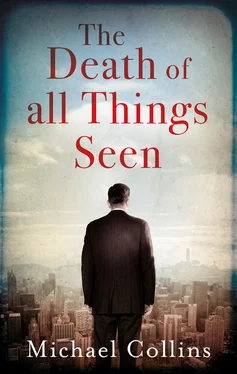Joanne looked up, reconciling it again, how a chance had been lost so long ago at the very beginning. She had loved Dave.
She remembered the end, the Thanksgiving she had gone back to see Dad, Peter smashed out of his mind and pitching the car into a snow bank not far from the house, so Dave had to drive them to their motel, Peter in the back seat moaning, Joanne up front with Dave staring straight ahead like the night couldn’t end quickly enough.
He was then pulling down more money than Peter ever made. Maybe it was what had made him feel the way he did, insolent and proud, and, despite his impervious indifference, Joanne conceded at the time, she’d thought about what it might have been like to be with Dave, to swap out her life with Sheryl, to submit to him, to feel his bigness between her legs again in the comfort of a home, and in the morning, rising to cook breakfast in housecoat and slippers, knowing that their daughter wouldn’t amount to a hill of beans, and to have it not matter, for life to continue where nothing worked out exactly as planned, and that it would be just fine. What she had thought at the time, against her own judgment, was it seemed the best of all possible worlds.
NATE TRIED TO book in early at The Drake. It wasn’t possible. There was a convention in town. The meeting with the lawyers was not until eleven. The concierge could, of course, store his luggage.
There was immediately, in looking around him, the tug of nostalgia. The hotel was redolent of a bygone era. The heavy cornices, the vases of flowers, sconces and oil paintings hung discreetly in alcoves. He glimpsed an ornate marble powder room glimpsed as a maid came out with a roll-cart of cleaning supplies.
This was the Chicago he remembered. He had booked into The Drake because this was where his father and mother had first met. To understand the past, Ursula had told him, it was best to go to the origin. He believed her, but he felt a gathering tiredness. It was hard carrying her memory with him.
He had not been up this early on a succession of days in a long time. He could very well have slept in advance of his meeting with the lawyers. Yes, he conceded, it had been unwise getting up so early, and yet he had wanted to be here with the pressing need that Ursula should see everything through his eyes, that she might know the extent of his existence. He was that alone in the world, or that contained, speaking to a dead woman. He was undecided. He suffered her loss more fully in being away from their home.
*
What he could tell Ursula was that, without The Drake, there would have been no Nate Feldman. That was a cosmic fact. In discussing his parents, he had always begun the inventory of his life with a quiet defense because there was blame to go around and he had never taken sides in the frigid affair that had been his parents’ marriage out in Winnetka.
What he remembered of his adolescent awakening was not the house in Winnetka. That was a part of his life, but more so the trips down South into a Southern Gothic tradition of WASP entitlement that better defined his mother. She had been sent North in the time of Southern ruin, in the days leading up to the rise of Martin Luther King, before Selma and the march on Montgomery. She had never settled right in Chicago. Of course, she had kept this desperation from his father during their brief courtship.
Of a lineage dating to the first holdings of plantations in Virginia, she had descended from those who had thought it a good idea to enslave another race for their own end and then laud their Bible with a divine right to what was done. Racist in the most absolute sense, she had asserted on more than one occasion while passing through the Chicago ghettoes that the complex racial politics of the city, if one looked deep enough, was connected to the Civil War, to the great tidal waves of unshackled Negroes, who, in rising out of the Deep South, had re-settled in the industrial rim of the Great Lakes, so it was eventually understood that this was what the prospect of freedom really looked like, that the killing fields of Shiloh, Antietam, and Gettysburg had only dislodged and shifted a greater discontent into the North.
And yet in saying so, she had cared deeply for Negroes, or certain Negroes attached to the house, those who knew their place. She held scandalous opinions, arguing how freedom so suddenly earned brought on the reality of not actually having a job. There were many Negroes who never left the land or the houses, Negroes not so much moved by Lincoln and The Emancipation Proclamation. What she thought of race relations was that the North had just asked the wrong Negroes what they wanted. She believed it.
There was the divining sense, in so describing the full aspect of her character, that she had maintained an absolute commitment to a history that would define her the longer she stayed away from the South and the more her looks failed her.
Or, to put it another way, she would become a caricature of the South.
Nate’s memories of Virginia were of the godawful Southern drawl of genteel manners, the strange affectation of men with a peculiar aplomb for drink and silk neckerchiefs — men like his grandfather who held onto tobacco too long, the South becoming decidedly conservative as the mania for a healthy lifestyle took hold — people wanting to stay alive as long as possible at the expense of actually living when the obvious truth was, there were those who died, those who survived, and then those in between. It was by then a great hardship to find tobacco, the surviving crop that, beyond the abomination of cotton, could be the new scourge — the South, twice damned.
His father had explained it once in defense of his mother, the fierce pride of the South, how the South became more and more extreme and looked eventually to a distant past and their Bible so they truly believed the world was approximately 5,000 years old. When you began fighting science, when you went down that road of fanaticism, when you defied facts, you ended up believing God put the dinosaurs down on earth, alongside the first humans, so the world was configured like a passable episode of The Flintstones .
*
Against his better judgment, Nate ordered a whiskey at the bar in The Drake. He was looking for evidence of a past, of some sense of a presence. He knew the outline of his father’s history. He was telling it to a ghost, Ursula beside him in a small booth.
It began over drinks, his father’s courtship. Teddy is what his mother called his father when recalling the good times. She had been dining with a gentleman at The Drake.
His father described having been captivated by her advancing and then dismissive stare, watching her eyes follow him. There had been a brazen charge to the occasion, his father, drunk in the mediating company of fellow recruits in a carousel of what the war years then allowed — a fraternity of men in a trawl of bars, in advance of the hell that awaited them.
Nate looked to the sepia light of the bar. It was there if he looked closely. The afterlife of what happened was left, its essence. All he had to do was see it. As the story went, his father, struck by the loss of so much in life and determined that each opportunity must be seized, had begun walking back and forth against a great paned window, affecting a Nazi goose-step. Then he waited round front.
Shelby Pettigrew showed with a haughty independence, smelling of mint julep and tobacco. She wore mink stoles and pumps. His father learned that the man she was dining with was her distant relation and that she was from the South, the latter fact betrayed by her accent.
At the time, Shelby was in the countdown of a dwindling allowance. She had been sent North to secure a Yankee Republican husband passable to a Confederate father looking to hold onto the past. Yet, for all the apparent deceit behind it, his mother carried his father through the war, or, more exactly, he carried her.
Читать дальше












